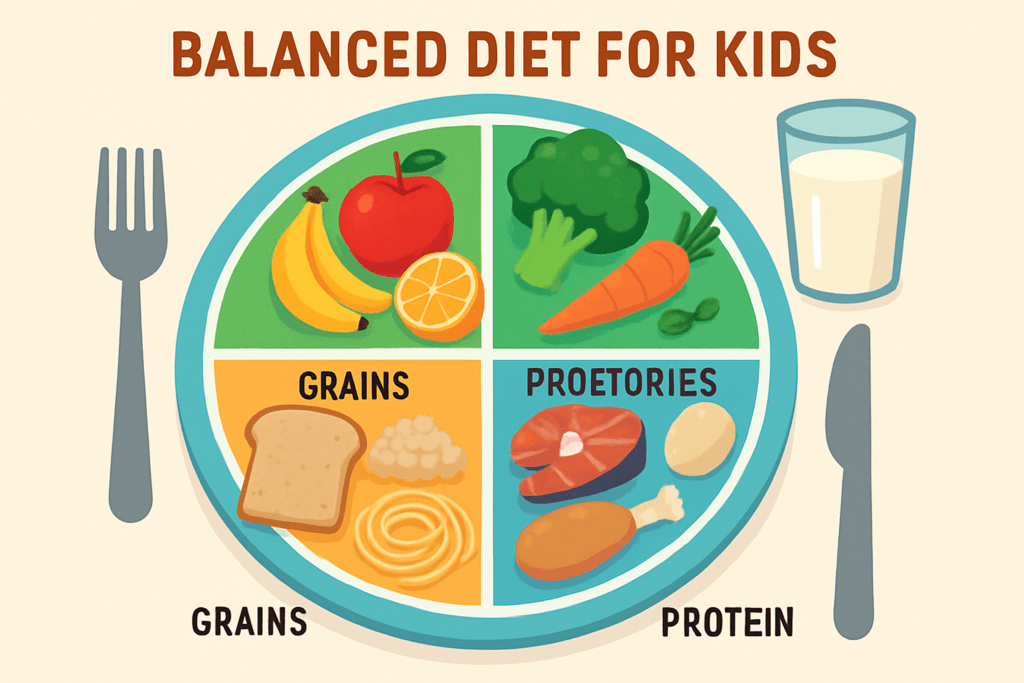Kids Eating Vegetables: Why It’s Tough (But Worth It)
- Quick intro: Most parents know the struggle—kids and veggies don’t always mix.
- Address why children resist vegetables (taste, texture, habits).
- Main keyword: kids eating vegetables.
- Highlight lasting health benefits and why it’s worth the effort.
Most parents know the struggle—kids and veggies don’t always mix. It’s a tale as old as time: the suspicious glance at a green bean, the mysterious disappearing broccoli, negotiations over “just one more bite.” Kids eating vegetables can feel like an uphill battle, and honestly, there are real reasons behind it. Many vegetables have bitter flavors or weird textures that stand out to younger taste buds. Kids naturally gravitate toward sweet, soft foods, and it can take a while for their palates to get on board with crunchy carrots or leafy greens.
Habits play a part, too. If vegetables have always been a “have to” instead of a “want to,” resistance builds. Sometimes, adults pass on their own “veggie baggage” without realizing it. But here’s the thing: putting in the effort pays off, big time. Vegetables are packed with vitamins, fiber, and nutrients that fuel healthy growth, boost immunity, and create good eating patterns that can last a lifetime. It’s not just about getting through dinner tonight—it’s about setting up your kid for a lifetime of better health. The journey may be bumpy, but when it comes to kids eating vegetables, the payoff is totally worth it.
Smart Ways to Get Kids Into Veggies
Start Early, Start Simple
If kids get used to seeing vegetables when they’re young, half the battle’s won. Slide grated carrots or peas into their scrambled eggs. Offer sweet potato sticks when they’re hungry for a snack—no need to get fancy yet. Early habits stick, but so do early tastes, so keep flavors mild and skip the heavy spices. The star here is the actual veggie, not what you hide it under.
Build a Routine With Veggie-Friendly Meals
Consistency works wonders. Aim for a vegetable (even just a few bites) at every lunch or dinner. Don’t be afraid to get sneaky: spinach blended into smoothies, zucchini in muffins, broccoli tucked into mac and cheese. These are all classic veggie-friendly meals that don’t trigger the “eww” response right away. The more normal vegetables seem, the less likely they’ll get ignored or shoved aside.
Make It Fun: Turn Veggies Into Games and Art
Sometimes, a carrot stick is just a carrot stick—unless it’s part of a smiley face on their plate. Making veggies fun flips the script. Cut bell peppers into stars or let kids build their own snack monsters out of celery, cherry tomatoes, and hummus. Kids also love having a job to do, so put them in charge of rinsing or arranging during meal prep. When vegetables become part of the fun, you’re lowering the battle lines and making them just another piece of the meal.
What Happens After Winning Millions?
Winning a life-changing lottery jackpot is every player’s dream, but few are prepared for what comes next. While the sudden influx of wealth can bring immense excitement, it also introduces many challenges. Here’s what tends to follow such life-altering events:
Managing Financial Decisions
The immediate financial decisions are often overwhelming:
- Tax Implications
- A large portion of the winnings is usually taxed.
- Mismanagement can lead to significant legal issues.
- Investment Strategies
- Many winners hire financial advisors to secure their assets.
- Others may fall prey to reckless spending, threatening their new fortune.
- Long-term Planning
- Without a solid budget, even vast riches can dwindle quickly.
Lifestyle Changes
A significant win often leads to a complete lifestyle overhaul:
- Luxury Acquisitions
- Purchasing high-end real estate, luxury cars, and exotic vacations become commonplace.
- Social Dynamics
- Friends and distant relatives may suddenly reappear, often with expectations of financial aid.
- Public Attention
- Winners frequently face unwanted media scrutiny and pressure.
Some opt for a quieter, low-profile lifestyle to avoid these challenges.
Creating Impact and Legacy
Some winners find fulfillment in using their newfound wealth for the greater good:
- Charitable Activities
- Significant donations to charities and community initiatives.
- Funding scholarships to support education.
- Economic Contributions
- Investments that support local businesses and create jobs.
Many winners transition from benefactors to community changemakers, underscoring the difference wealth can make beyond personal gain. However, not all stories are positive; failure to manage finances can lead to rapid financial decline, highlighting the importance of careful planning.
Build a Routine With Veggie-Friendly Meals
Getting kids used to vegetables isn’t a one-time negotiation—it’s a daily practice. Start simple: make sure there’s a vegetable on every lunch and dinner plate, even if it’s just a single carrot stick or a sprinkle of peas. It’s all about routine. Over time, normalizing veggies as a regular part of meals—your go-to veggie-friendly meals—makes them less of a “big deal.” If plain veggies don’t fly, get creative. Add chopped spinach into pasta sauce, toss extra peppers into soups, or mix shredded zucchini into meatballs or burgers. The key? Don’t panic if they pick around vegetables at first. Kids often warm up after repeated, low-pressure exposure. Keep meals balanced and laid-back, and let “veggie-friendly meals” become the unsung heroes of your weeknight table.
Make It Fun: Turn Veggies Into Games and Art
Let’s be real: sitting down to a plate of plain broccoli won’t get most kids excited. Here’s where making veggies fun comes in. Try arranging vegetables into colorful shapes, like stars, animals, or simple smiley faces—a little creativity can go a long way. Don’t be afraid to bust out the toothpicks or bento boxes. Kids are more likely to taste something that looks playful.
Invite your child to help wash, peel, or set up veggies on the plate. Letting them arrange cucumber wheels or stack carrot sticks gives them a sense of ownership (and a sneaky hands-on lesson in food prep). Turn tasting new veggies into a game—maybe rate them on a funny face scale, or keep track on a “veggie scorecard” taped to the fridge. The trick isn’t to hide what you’re serving, but to spotlight it in a fun, non-serious way. When eating vegetables feels like play, rather than a chore, you’re already halfway to winning the veggie battle.
Involve Kids in The Process
Kids are more likely to eat vegetables when they’re part of the action. Bring them along for grocery shopping and let them pick a new veggie to try—even if it’s just out of curiosity. At home, simple kitchen tasks work wonders. Little hands can wash carrots, snap green beans, or stir salad dressing. When kids get to prep, peel, or just mix things up, the mystery fades and investment grows. Even the pickiest eaters soften when they feel ownership over what’s on their plates. It’s not about perfection, it’s about participation. Give them a small job and watch their willingness to taste vegetables slowly build. Sometimes, that sense of involvement is the secret ingredient you needed all along.
Keep Your Cool: The Power of Patience and Repetition
Kids can be stubborn about vegetables—no shock there. The important thing? Don’t lose your cool. Serve veggies in a bunch of different ways: roasted for sweetness, raw for crunch, blended into soups if that’s all they’ll touch. The trick is steady, gentle exposure. Don’t badger or bribe. Just offer, again and again, without drama. Kids’ taste buds actually change as they grow, so what’s a hard “no” at age four could quietly become an “okay, maybe” at age six. Sometimes they need to see a veggie a dozen times before even thinking about tasting it. If they push the dish away, shrug and try again next meal. Patience and repetition matter more than waging war over one bite. Stay calm—this is a long game, and pressure tends to backfire. Keep it routine, keep it chill, and eventually their curiosity might just win.
What Happens After Winning Millions?
Winning a life-changing lottery jackpot is every player’s dream, but few are prepared for what comes next. The sudden influx of wealth can bring excitement, but also a wave of challenges. Many winners find themselves overwhelmed by financial decisions, from managing taxes to making smart investments. Some handle it well, while others struggle with reckless spending that drains their fortune faster than expected.
The Financial Reality of Winning
Many winners face critical financial decisions almost immediately:
- Taxes and Legal Issues – A large chunk of the winnings often goes to taxes, and failing to plan can lead to legal troubles.
- Investing vs. Spending – Some winners hire financial advisors to ensure long-term security, while others spend impulsively without a plan.
- Budgeting for the Future – Without proper money management, even the biggest jackpots can disappear quickly.
A Lifestyle Overhaul
A sudden fortune changes life in more ways than one:
- Luxury Purchases – Mansions, sports cars, and extravagant vacations become instantly affordable.
- Social Pressure – Long-lost friends and distant relatives often reappear, expecting a share of the winnings.
- Privacy Challenges – Some winners struggle with unwanted media attention and public scrutiny.
While some winners embrace their new wealth openly, others choose to live discreetly to avoid pressure and expectations.
Giving Back and Creating a Legacy
For some, wealth is not just about personal luxury—it’s an opportunity to make a difference. Many winners choose to:
- Donate to charities and community projects
- Fund scholarships or support education initiatives
- Invest in businesses that create jobs and opportunities
Some lottery winners go from players to philanthropists, proving that wealth can be used to leave a lasting impact. However, not all stories end positively—many who fail to manage their winnings properly find themselves bankrupt within years.
What Happens After Winning Millions?
Winning a life-changing lottery jackpot is every player’s dream, but few are prepared for what comes next. The sudden influx of wealth brings excitement—as well as a wave of challenges. Many winners become overwhelmed by financial decisions, from managing taxes to making investments for future security. While some handle these challenges well, others struggle with reckless spending that quickly depletes their fortunes.
The Financial Reality of Winning
Many winners face critical financial decisions almost immediately:
- Taxes and Legal Issues
- A large portion of the winnings often goes to taxes, and inadequate planning can lead to legal complications.
- Investing vs. Spending
- Some winners hire financial advisors for long-term security, while others spend impulsively.
- Budgeting for the Future
- Without proper management, even the most substantial jackpots can vanish quickly.
A Lifestyle Overhaul
Sudden wealth changes life in numerous ways:
- Luxury Purchases
- Mansions, sports cars, and lavish vacations become instantly accessible.
- Social Pressure
- Long-lost friends and distant relatives reappear, expecting a share of the winnings.
- Privacy Challenges
- Some winners grapple with unwanted media attention and public scrutiny.
While some embrace their new wealth openly, others choose to live discreetly to avoid pressure and expectations.
Giving Back and Creating a Legacy
For some, wealth provides an opportunity to make a significant difference. Many winners choose to:
- Donate to charities and community projects
- Fund scholarships or support educational initiatives
- Invest in businesses that create jobs and opportunities
Some lottery winners transition from players to philanthropists, proving that wealth can be a tool for leaving a lasting impact. However, not all stories end positively. Many who fail to manage their winnings properly find themselves bankrupt within years.
What Happens After Winning Millions?
Winning a life-changing lottery jackpot is every player’s dream, but few are prepared for what comes next. The sudden influx of wealth can bring excitement, but also a wave of challenges. Many winners find themselves overwhelmed by financial decisions, from managing taxes to making smart investments. Some handle it well, while others struggle with reckless spending that drains their fortune faster than expected.
The Financial Reality of Winning
Many winners face critical financial decisions almost immediately:
- Taxes and Legal Issues: A large chunk of the winnings often goes to taxes, and failing to plan can lead to legal troubles.
- Investing vs. Spending: Some winners hire financial advisors to ensure long-term security, while others spend impulsively without a plan.
- Budgeting for the Future: Without proper money management, even the biggest jackpots can disappear quickly.
A Lifestyle Overhaul
A sudden fortune changes life in more ways than one:
- Luxury Purchases: Mansions, sports cars, and extravagant vacations become instantly affordable.
- Social Pressure: Long-lost friends and distant relatives often reappear, expecting a share of the winnings.
- Privacy Challenges: Some winners struggle with unwanted media attention and public scrutiny.
While some winners embrace their new wealth openly, others choose to live discreetly to avoid pressure and expectations.
Giving Back and Creating a Legacy
For some, wealth is not just about personal luxury—it’s an opportunity to make a difference. Many winners choose to:
- Donate to charities and community projects
- Fund scholarships or support education initiatives
- Invest in businesses that create jobs and opportunities
Some lottery winners go from players to philanthropists, proving that wealth can be used to leave a lasting impact. However, not all stories end positively—many who fail to manage their winnings properly find themselves bankrupt within years.
External Resource: Professional Advice
If you want to dig deeper or just need a little more backup, sometimes it helps to hear what the experts have to say. There are loads of practical tips out there for kids eating vegetables, from creative recipes to handling picky phases. For more tried-and-true advice straight from dietitians, swing by these ideas for kids eating vegetables. No fluff—just solid, trustworthy info that could make your dinnertime battles a bit easier.
Final Thoughts: Keep Trying, Keep It Chill
Getting kids eating vegetables isn’t something you master overnight. Some meals, you’ll feel like a veggie wizard. Other days, the carrots get a hard pass and land on the floor. Don’t sweat it. Progress counts more than perfection. The trick is to build steady habits—offer vegetables, make them visible, keep the atmosphere low-pressure, and celebrate those small “just-one-bite” wins. Over time, your patience pays off with better children’s vegetable intake and a healthier family table. Stick with it, stay relaxed, and remember—every green bean counts.


 Health & Nutrition Editor
Health & Nutrition Editor
